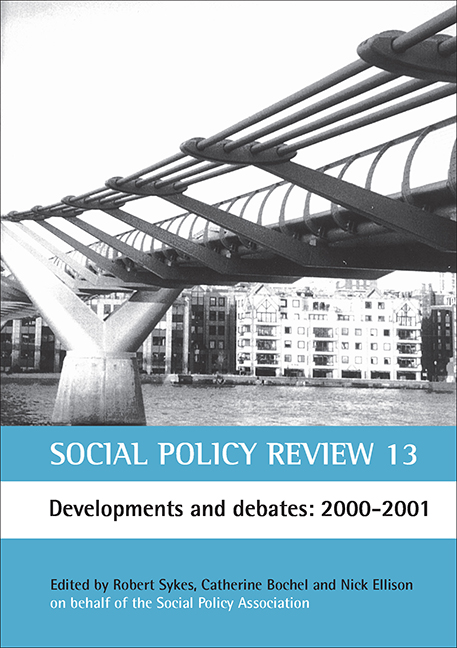Part Two - International developments
Published online by Cambridge University Press: 20 January 2022
Summary
The chapters in this section have one feature in common: they all address the issue of pressures for change and the actual or potential transformations of social policy in various international contexts. Whether considering a specific policy area, a range of national or regional social policy systems, or the implications of changing work patterns, the chapters all point to the central importance of international comparison for contemporary social policy analysis.
John Dixon’s chapter (Chapter Six) provides a wide range of information on marketisation pressures and changes in social security systems right across the globe. Dixon provides a clear and incisive analytical framework for understanding these changes, and indeed, for evaluating the ideological context of the changes being made. In short, the chapter not only reviews the changes in social security policy towards the marketised and away from the publicly-funded, but also provides a fascinating discussion of the ethical and practical governance questions that such changes bring with them.
Turning to Nick Manning’s chapter (Chapter Seven), again we are provided with a wide-ranging survey of social policy issues, this time in the countries of Central and Eastern Europe. The pressures on social policy here are at least twofold: these countries are struggling to transform their previous welfare regimes to the constraints and challenges of an aggressively capitalist world economy, while at the same time struggling to deal with fundamental problems of poverty and social exclusion which appear to have become worse since the transition from communist control. Manning shows that the central problem for such countries is that of rising social costs for welfare, plus a mix of poorly organised and poorly performing economies which show little potential for being able to pay such costs in the short to medium term. The role of international actors, especially the UN in this case, in supporting such transition countries to cope with their economic and social welfare problems, appears vital in such circumstances.
Christian Aspalter (Chapter Eight) provides a rather different survey of social policy developments, this time in a quite different international context: looking at the systems of Taiwan, Hong Kong and mainland China.
- Type
- Chapter
- Information
- Social Policy Review 13Developments and Debates: 2000–2001, pp. 107 - 108Publisher: Bristol University PressPrint publication year: 2001



